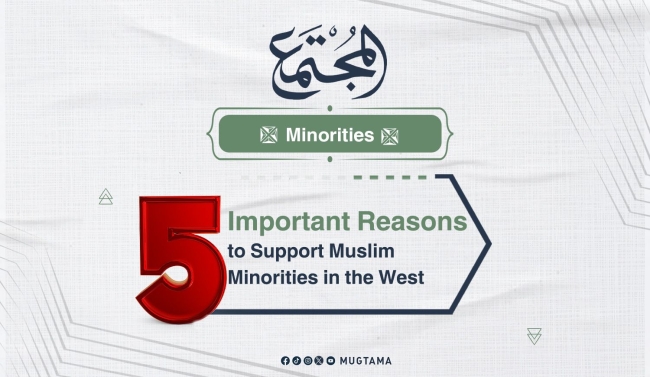5 Important Reasons to Support Muslim Minorities in the West
Our noble religion always encourages us to become one united nation, interconnected through cohesion and solidarity in facing life's challenges and the plans of the enemies of this faith. Therefore, various verses and hadiths emphasize these meanings, including the solidarity that naturally extends to striving to support Muslim minorities, especially in Western countries, in light of the major challenges they face that weigh heavily on them over time and place them in difficult situations.
Among the reasons that make us stand by our brothers from Muslim minorities in Western countries are the following:
- The bond of brotherhood in faith:
This is the strongest tie of faith among the members of the Muslim Ummah. From this standpoint, we must change our perception of minorities from a marginal, secondary issue to one of the major issues that should be among the priorities of Muslim states and peoples.
- Following the example of the Prophet:
The model of a Muslim state during the time of the Prophet Muhammad (peace be upon him) paid great attention to Muslim minorities in both times of peace and war. Evidence of this includes the sending of ambassadors by the Prophet, such as Mus'ab ibn Umayr to Medina, Mu'adh ibn Jabal, Abu Musa al-Ash'ari, Khalid ibn al-Walid to Yemen, and other companions to various regions.
- The necessity of improving the image of Islam in the West:
Muslims in Western countries can be a model of goodness and reform, and a bright representation of Islam, making them an example of a Muslim who takes pride in their faith. However, for this to happen, they need adequate care and support.
- Building a bridge of communication between the Islamic world and the Western world:
Muslim minorities currently live in the focal point of conflict between the Islamic and Western sides. Thus, they are the most capable and qualified to understand both sides and act as a missing link between them.
- Preserving the identity of the Muslim Ummah:
There is no doubt that the communities of Muslim minorities in Europe represent an important part of the identity of this Ummah. Therefore, preserving these communities from Westernization, dissolution, and forced integration is crucial for safeguarding the foundational element of the Islamic Ummah's identity. To the extent that minority communities are granted freedom of belief and freedom of worship, they can preserve their heritage and cultural identity, which is certainly vital for maintaining the identity of an important part of the body of the Islamic world.


